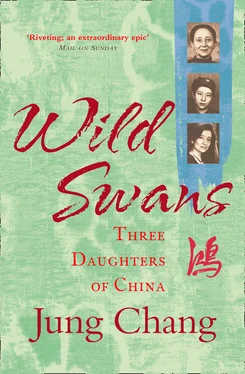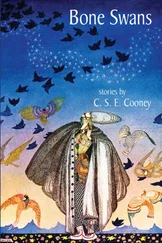The tragedy did not end there. Bai’s mother was working as a live-in servant in the house of a wealthy family which owned a small gold shop. She was heartbroken at the death of her only daughter, and incensed by the scurrilous suggestions in the papers that her daughter had had several lovers who had fought over her and eventually killed her. A woman’s most sacred possession was her chastity, which she was supposed to defend to the death. Several days after Bai’s death, her mother hanged herself. Her employer was visited by thugs who accused him of being responsible for her death. It was a good pretext to extort money, and it did not take long for the man to lose his gold shop. One day there was a knock on the Xias’ door and a man in his late thirties, dressed in Kuomintang uniform, came in and bowed to my grandmother, addressing her as ‘elder sister’ and Dr Xia as ‘elder brother-in-law’. It took them a moment to realize that this smartly dressed, healthy, well-fed man was Han-chen, who had been tortured and saved from the garrotte, and whom they had hidden in their old house for three months and nursed back to health. With him, also in uniform, was a tall, slender young man who looked more like a college student than a soldier. Hanchen introduced him as his friend Zhu-ge. My mother immediately took to him.
Since their last encounter Han-chen had become a senior official in Kuomintang intelligence, and was in charge of one of its branches for the whole of Jinzhou. As he left, he said: ‘Elder sister, I was given back my life by your family. If you ever need anything, anything at all, all you have to do is say the word and it will be done.’
Han-chen and Zhu-ge came to visit often, and Han-chen soon found jobs in the intelligence apparatus for both Dong, the former executioner who had saved his life, and my grandmother’s brother-in-law Pei-o, the former prison warder.
Zhu-ge became very friendly with the family. He had been studying science at university in Tianjin and had fled to join the Kuomintang when the city had fallen into Japanese hands. On one of his visits my mother introduced him to Miss Tanaka, who had been living with the Xias. They hit it off, got married, and went to live in rented rooms. One day Zhu-ge was cleaning his gun when he accidentally touched the trigger and the gun went off. The bullet passed straight through the floor and killed the landlord’s youngest son, who was in bed downstairs. The family did not dare to bring a charge against Zhu-ge because they were frightened of intelligence men, who could accuse anyone they chose to of being a Communist. Their word was law, and they had the power of life and death. Zhu-ge’s mother gave the family a large sum of money as compensation. Zhu-ge was distraught, but the family did not even dare show any anger towards him. Instead, they showed exaggerated gratitude, out of fear that he might anticipate that they would be angry, and harm them. He found this hard to bear, and soon moved out.
Lan’s husband, Uncle Pei-o, prospered in the intelligence system and was so delighted with his new employers that he changed his name to ‘Xiao-shek’ (‘Loyalty to Chiang Kai-shek’). He was a member of a three-man group under Zhu-ge. Initially their job was to purge anyone who had been pro-Japanese, but very soon this slid into watching out for students showing pro-Communist sympathies. For a while, ‘Loyalty’ Pei-o did what was asked of him, but his conscience soon began to trouble him; he did not want to be responsible for sending people to prison or choosing victims for extortion. He asked for a transfer and was given a job as a watchman at one of the city checkpoints. The Communists had left the city of Jinzhou but had not gone very far. They were engaged in constant battles with the Kuomintang in the surrounding countryside. The Jinzhou authorities were trying to keep tight control over the most vital commodities to stop the Communists from getting hold of them.
Being in intelligence gave ‘Loyalty’ power, which brought him money. Gradually he began to change. He started smoking opium, drinking heavily, gambling, and frequenting brothels, and soon contracted a venereal disease. My grandmother offered him money to try to get him to behave, but he carried on as before. However, he could see that food was becoming increasingly scarce for the Xias, and often invited them to good meals at his house. Dr Xia would not let my grandmother go. ‘Those are ill-gotten gains and we don’t want to touch them,’ he said. But the thought of some decent food was sometimes too strong a temptation for my grandmother and occasionally she would sneak off to the Pei-o house with Yu-lin and my mother for a square meal.
When the Kuomintang first came to Jinzhou Yu-lin was fifteen years old. He had been studying medicine with Dr Xia, who thought he had a promising future as a doctor. By now my grandmother had taken on the position of the female head of the family as her mother, sister, and brother were all dependent on her husband for a living, and she felt it was time Yu-lin got married. She soon settled on a woman who was three years older than him and came from a poor family, which meant she would be hard-working and capable. My mother went with my grandmother to see the prospective bride; when she came in to bow to the visitors in the sitting room, she was wearing a green velvet gown which she had had to borrow for the occasion. The couple were married in a registry office in 1946, the bride wearing a rented Western-style white silk veil. Yu-lin was sixteen and his wife was nineteen.
My grandmother asked Han-chen to find Yu-lin a job. One of the vital commodities was salt, and the authorities had forbidden selling it to the countryside. Of course, they were running a salt racket themselves. Han-chen got Yu-lin a job as a salt guard, and several times he was almost involved in serious skirmishes with Communist guerrillas and other Kuomintang factions who were trying to capture the salt. Many people were being killed in the fighting. Yu-lin found the job frightening, and was also tormented by his conscience. Within a few months he quit.
By this time, the Kuomintang was gradually losing control of the countryside, and was finding it harder and harder to get recruits. Young men were increasingly unwilling to become ‘bomb ashes’ ( pao-hui ). The civil war had become much more bloody, with enormous casualties, and the danger of being conscripted or simply impressed into the army was growing. The only way to keep Yu-lin out of uniform was to buy him some form of insurance, so my grandmother asked Han-chen to find him a job in intelligence. To her surprise, he refused, telling her it was no place for a decent young man.
My grandmother did not realize that Han-chen was in deep despair about his work. Like ‘Loyalty’ Pei-o he had become an opium addict, and was drinking heavily and visiting prostitutes. He was visibly wasting away. Han-chen had always been a self-disciplined man, with a strong sense of morality, and it was most unlike him to let himself go in this way. My grandmother thought that the ancient remedy of marriage might pull him around, but when she put this to him he said he could not take a wife, because he did not want to live. My grandmother was shocked, and pressed him to tell her why, but Han-chen only started weeping and said bitterly that he was not free to tell her, and that she could not help anyway.
Han-chen had joined the Kuomintang because he hated the Japanese. But things had turned out differently from what he had envisaged. Being involved in the intelligence system meant that he could hardly avoid having innocent blood—of his fellow Chinese—on his hands. But he could not get out. What had happened to my mother’s college friend Bai was what happened to anyone who tried to quit. Han-chen probably felt that the only way out was to kill himself, but suicide was a traditional gesture of protest and might bring trouble to his family. Han-chen must have come to the conclusion that the only thing he could do was to die a ‘natural’ death, which was why he was going to such wild extremes in abusing his body and why he refused to take any treatment.
Читать дальше












